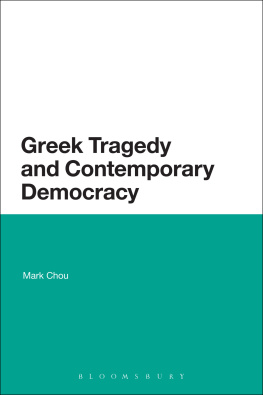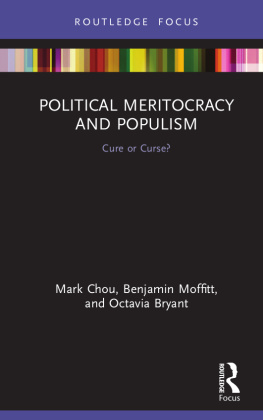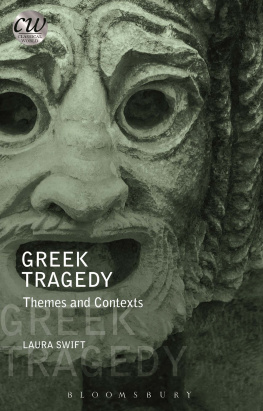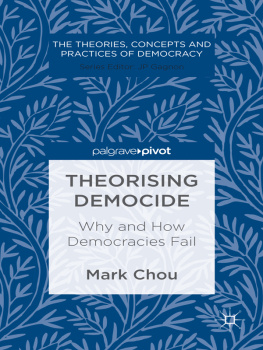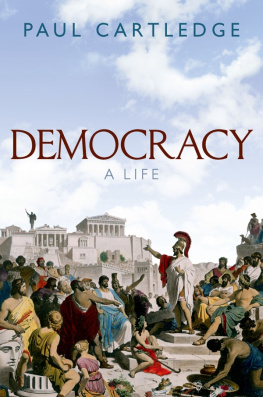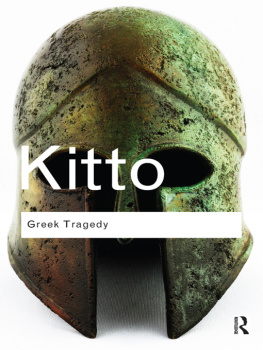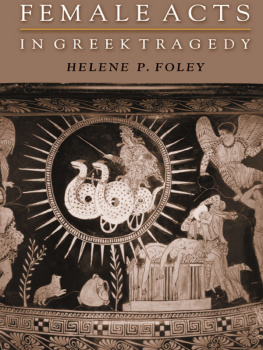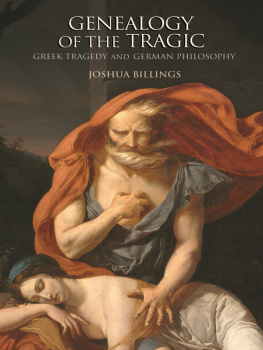Mark Chou - Greek Tragedy and Contemporary Democracy
Here you can read online Mark Chou - Greek Tragedy and Contemporary Democracy full text of the book (entire story) in english for free. Download pdf and epub, get meaning, cover and reviews about this ebook. year: 2012, publisher: Bloomsbury, genre: Politics. Description of the work, (preface) as well as reviews are available. Best literature library LitArk.com created for fans of good reading and offers a wide selection of genres:
Romance novel
Science fiction
Adventure
Detective
Science
History
Home and family
Prose
Art
Politics
Computer
Non-fiction
Religion
Business
Children
Humor
Choose a favorite category and find really read worthwhile books. Enjoy immersion in the world of imagination, feel the emotions of the characters or learn something new for yourself, make an fascinating discovery.
Greek Tragedy and Contemporary Democracy: summary, description and annotation
We offer to read an annotation, description, summary or preface (depends on what the author of the book "Greek Tragedy and Contemporary Democracy" wrote himself). If you haven't found the necessary information about the book — write in the comments, we will try to find it.
Mark Chou: author's other books
Who wrote Greek Tragedy and Contemporary Democracy? Find out the surname, the name of the author of the book and a list of all author's works by series.
Greek Tragedy and Contemporary Democracy — read online for free the complete book (whole text) full work
Below is the text of the book, divided by pages. System saving the place of the last page read, allows you to conveniently read the book "Greek Tragedy and Contemporary Democracy" online for free, without having to search again every time where you left off. Put a bookmark, and you can go to the page where you finished reading at any time.
Font size:
Interval:
Bookmark:
Greek Tragedy and Contemporary Democracy
Greek Tragedy and Contemporary Democracy
Mark Chou

Bloomsbury Academic
An imprint of Bloomsbury Publishing Plc
175 Fifth Avenue | 50 Bedford Square |
New York | London |
NY 10010 | WC1B 3DP |
USA | UK |
www.bloomsbury.com
First published 2012
Mark Chou, 2012
All rights reserved. No part of this publication may be reproduced or transmitted in any form or by any means, electronic or mechanical, including photocopying, recording, or any information storage or retrieval system, without prior permission in writing from the publishers.
No responsibility for loss caused to any individual or organization acting on or refraining from action as a result of the material in this publication can be accepted by Bloomsbury Academic or the author.
Library of Congress Cataloging-in-Publication Data
A catalog record for this book is available from the Library of Congress.
ePub ISBN: 978-1-4411-9048-2
Typeset by Deanta Global Publishing Services, Chennai, India
Contents
Before beginning, a short word of thanks to the handful of individuals whose kindness and encouragement made this work possible. First, I am indebted to Roland Bleiker, a mentor and friend in the truest sense. Second, to the small group of scholars and friends who urged me to go on when all I wanted to do is stop. Here, Id particularly like to thank Seb Kaempf, Emma Hutchison, Luke Glanville, Katrina Lee-Koo, Michael Ure, Robin Cameron, Tim Aistrope, Heloise Weber, Richard Devetak, and of course Leah Aylward. The names of these individuals may be absent from the pages that follow. But their influence is not.
This book has now gone through more drafts than I can remember. But imperfect as it remains in content and in form, a fault that is mine alone, it is what it is today only because individuals like Stephen Chan, Costas Constantinou, Kim Huynh, and a select anonymous few took the time to give what they could to help me see what I had not seen. I will always be in your debt.
Id also like to take this opportunity to acknowledge Marie-Claire Antoine, my editor at Continuum, who gladly took this project on; the School of Political Science and International Studies at the University of Queensland and the School of Social and Political Sciences at the University of Melbourne where this project first began and is now drawing to an end; and the McKenzie Postdoctoral Fellowship scheme at the University of Melbourne which gave me the time and space to complete this project.
Finally, none of this could have been possible without my family, who continue to support my study and forgive my long absences away from home, even during the difficult times. The past few years have seen some change in our family. I moved away from Canberra. My Grandma passed away. My Dad single-handedly rebuilt our house (with the help of some lovely but truly dodgy builders), which is now gigantic, before retiring after more than 40 years of work. And then my Mum was diagnosed with cancer. Since then, my Dad and my Sister, who is a credit to our entire family, have sacrificed so much to give her the best care possible. But the best care possible is not always enough in these circumstances, and not a day goes by that they dont fear for the worst. Still, today at least, were all hopeful for the best. And finally, to Bec, thanks for continuing to go on pho dates with me!
Earlier versions of several chapters within this book were first published elsewhere in other forms and formats: Mark Chou and Roland Bleiker, The Symbiosis of Democracy and Tragedy: Lost Lessons from Ancient Greece, Millennium: Journal of International Studies (Vol. 37, No. 3, 2009): 659682; Mark Chou, Democracy in an Age of Tragedy: Democracy, Tragedy and Paradox, Critical Horizons: A Journal of Philosophy and Social Theory (Vol. 11, No. 2, 2010): 289313; Mark Chou, Postmodern Dramaturgy, Premodern Drama: The Global Resurgence of Greek Tragedy Today, Journal for Cultural Research (Vol. 15, No. 2, 2011): 131152. I thank each publisher for giving me permission to include the content within this book.
It was a late November evening in 2004 when, at the close of a State Theatre Company of South Australia performance of Euripides drama The Trojan Women , an unexpected cry pierces the theatres silence. A woman, who had shifted from her seat in the auditoriums lower balcony, suddenly shouts out to the departing crowd that this referring to Euripides tragedy about the violent conquest and occupation of a local population by a mighty foreign army is whats happening in Falugia today. Fingers pointed visibly at the stage, she makes the point to those still seated in the theatre that [w]e should be ashamed of what we are doing in Iraq today. Its our troops, in Iraq, she continues, now, killing women and children.
Ruth Thompson, a theatre critic who sat through the nights performance, recounts the events that followed. As she recalls, startled or maybe just buoyed by the womans offhand remarks, concurring cries of Shame! Shame! arose throughout the theatre. Soon, more and more people began to speak up, until the theatre filled with their applause and their murmurings about our collective responsibility as electors of the current government; as citizens of a country that had sent its troops to an illegal war; that we must not passively allow it to continue. Though there was nothing like a formal resolution to act, and certainly no overt political references made during the performance, a chorus of citizen viewers did arise that night to voice dissatisfaction and dissent. What Thompson remembers quite clearly then was a collective if not democratic spirit emerge; one that, fleeting as it was, caused the vast majority of theatregoers following the nights performance to unite in a collective Here, here.
When Thompson later relayed these events to Rosalba Clemente, the Australian playwright and director who was responsible for producing the Euripidean tragedy, her reaction was surprising in that she did not seem at all surprised. Good. Good was Clementes response. As Thompson notes, on hearing the democratic tone of the audiences response to the tragedy, Clemente went on to surmise that I feel now that Ive done my job. For her to say these words the implication was almost that, even in a context and for an audience largely removed from the classics of the ancient world, a Greek tragedy like Euripides The Trojan Women might still have the potential to speak politically. Additionally, there may also be something unique to the tragedies of ancient Greece that makes them apt to arouse democratic sensitivities today just as the tragedies of Aeschylus, Sophocles and Euripides had done so during democracys first high point in ancient Athens some two-and-half millennia ago.
But that, of course, is a minority view. Today, it is almost unheard of in everyday political debates for democracy to be associated with tragedy or for tragedy to stimulate democratic debates. Unlike the ancient Greeks to whom we attribute the birth of Western democracy, we do not turn to their tales of tragedy (even though we may continue to turn readily to their teachings on politics and philosophy) when seeking to revitalize our own democratic politics. That symbiosis, between democracy and tragedy, may have been vital then. Now, in more modern times, choosing to see tragedy as a democratic art form seems nothing short of a political nonsense.
At one level, this is understandable. The world we inhabit, the political challenges we face and the types of institutions we require to ensure the smooth functioning of our increasingly globalized society are vastly different from the demands faced by the ancient Greeks. We think, act and live as humans separated by two-and-a-half millennia of historical development.
Next pageFont size:
Interval:
Bookmark:
Similar books «Greek Tragedy and Contemporary Democracy»
Look at similar books to Greek Tragedy and Contemporary Democracy. We have selected literature similar in name and meaning in the hope of providing readers with more options to find new, interesting, not yet read works.
Discussion, reviews of the book Greek Tragedy and Contemporary Democracy and just readers' own opinions. Leave your comments, write what you think about the work, its meaning or the main characters. Specify what exactly you liked and what you didn't like, and why you think so.

